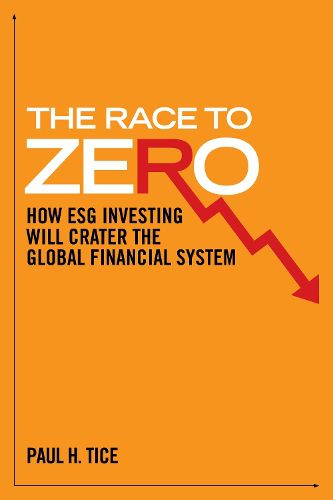Readings Newsletter
Become a Readings Member to make your shopping experience even easier.
Sign in or sign up for free!
You’re not far away from qualifying for FREE standard shipping within Australia
You’ve qualified for FREE standard shipping within Australia
The cart is loading…






"Paul Tice delivers a body-blow to the predations of the ESG-industrial-complex."
-Mark P. Mills,Senior Fellow, Manhattan Institute
Over the past few years, so-called "sustainable investing"-a new practice based on the theory that environmental, social, and governance (or "ESG") factors should drive corporate policy and investment decisions-has swept across Wall Street. Spurred on by the United Nations, national governments, and financial regulators, and cheered on by academics, environmental activists, and the media, the ESG orthodoxy has received little public resistance as it has integrated itself into almost every corner of the financial sector. By 2030, the iron curtain of sustainability will have fully cast its shadow across Wall Street.
The Race to Zero provides a detailed rebuttal to the case for sustainable investing from the perspective of a long-time Wall Street analyst, investor, and latter-day finance professor. Sustainable investing does not aim to generate excess returns for investors or to further ethical goals such as improving society or saving the planet; rather, it seeks to seize control of the world's financial system in order to ensure that the allocation of capital and investments across markets is politically favorable to establishment interests.
By limiting financial market access, ESG is designed to create a compliant corporate sector to serve as both Greek chorus and funding source for the environmental and social causes championed by government and the elite class. Climate change is its driving force and priority goal, and its main targets are fossil fuel companies operating in the industrialized Western world. This book is designed to expose these truths in plain-spoken language-free of financial jargon-to reach the widest possible audience, including the silent majority on Wall Street that is now afraid to speak up about ESG.
$9.00 standard shipping within Australia
FREE standard shipping within Australia for orders over $100.00
Express & International shipping calculated at checkout
"Paul Tice delivers a body-blow to the predations of the ESG-industrial-complex."
-Mark P. Mills,Senior Fellow, Manhattan Institute
Over the past few years, so-called "sustainable investing"-a new practice based on the theory that environmental, social, and governance (or "ESG") factors should drive corporate policy and investment decisions-has swept across Wall Street. Spurred on by the United Nations, national governments, and financial regulators, and cheered on by academics, environmental activists, and the media, the ESG orthodoxy has received little public resistance as it has integrated itself into almost every corner of the financial sector. By 2030, the iron curtain of sustainability will have fully cast its shadow across Wall Street.
The Race to Zero provides a detailed rebuttal to the case for sustainable investing from the perspective of a long-time Wall Street analyst, investor, and latter-day finance professor. Sustainable investing does not aim to generate excess returns for investors or to further ethical goals such as improving society or saving the planet; rather, it seeks to seize control of the world's financial system in order to ensure that the allocation of capital and investments across markets is politically favorable to establishment interests.
By limiting financial market access, ESG is designed to create a compliant corporate sector to serve as both Greek chorus and funding source for the environmental and social causes championed by government and the elite class. Climate change is its driving force and priority goal, and its main targets are fossil fuel companies operating in the industrialized Western world. This book is designed to expose these truths in plain-spoken language-free of financial jargon-to reach the widest possible audience, including the silent majority on Wall Street that is now afraid to speak up about ESG.